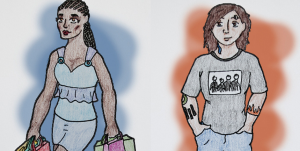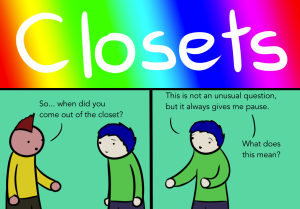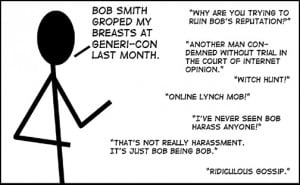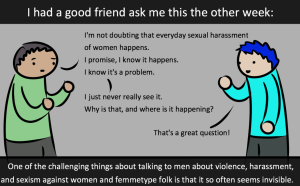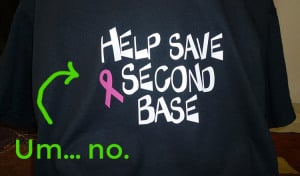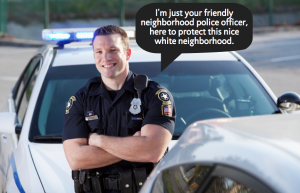
Source: Collegian
Recently, I was gossiping with my neighbor about a mutual friend whose wife had moved out, making him the primary parent to their two- and four-year-old children.
“He’s been pretty amazing,” I said. “She even took the car, so he brings the kids to daycare on the bus. Then he takes the train to work. He’s lucky if he even gets to play basketball once a week. And you know how much he loves his league.”
Later, I reflected on the conversation.
Despite also being a car-less, transit-using single parent who can’t remember the last time I had a regular weekly recreational activity not related to the eight-and-under set, I found myself marveling at this friend’s sacrifices. Then I found myself annoyed that I had slipped into such a typical line of thought.
And if the research is to be believed, it’s not only typical to assume that single dads are doing something heroic, but it’s just as typical to think that single moms are doing just the opposite.
What the Research Says
Two separate 2012 studies published in the Journal of Feminist Family Therapy confirmed that many people put single dads on a pedestal while hyper-policing single moms.
In the first study, Negative Perceptions of Never-Married Custodial Single Mothers and Fathers: Applications of a Gender Analysis for Family Therapists, authors Amanda Haire and Christi McGeorge determined that many of the beliefs about single parents stem from the view that single fathers have admirably risen to the challenge of parenting by choice, while single mothers are assumed to be parenting out of a necessity resulting from bad judgment, accidental pregnancy, or the failure to maintain a relationship.
The researchers also determined that negative views about single motherhood tend to stem from a conviction that there is something inherently wrong or damaged about a single mother as a person.
Notably, descriptions of single moms given by the study’s respondents included the beliefs that this group of parents was neglectful, irresponsible, immature, stressed out, depressed, prone to making bad choices, promiscuous, hopeless, and / or insecure.
Single fathers, on the other hand, were perceived by those surveyed as individuals in a challenging situation who had to worry about complications of solo parenting like paying child support, finding child-care, and balancing their dating life with raising kids. Not exactly the personal character flaws attributed to the moms!
In the second paper, Attitudes Toward Never-Married Single Mothers and Fathers: Does Gender Matter?, researcher Sarah DeJean and colleagues found that when given a fictional narrative about single parents, identical, save for the gender of the subject, study participants were more judgemental of the mothers in the story than they were of the fathers.
Indeed, subjects rated mothers as “less secure, less fortunate, less responsible, less satisfied with life, less moral, less reputable, less of a good parent, and less economically advantaged” when compared to the ratings of the single father, despite the fact the only difference in the vignettes were names and pronouns.
Negative Views Lead to Real-Life Risks for Moms
The effects of such beliefs don’t just mean we fawn over single dads and tut-tut over single moms. What we have seen all too often is cases where single moms have either been arrested, faced criminal child endangerment charges, or lost custody of their children for what has been termed child neglect.
In the last few months alone, there has been coverage of a number of moms in these situations.
One example was Shanesha Taylor, a single mom in Arizona who lost custody of her toddler and six-month-old after babysitting fell through and she was forced to leave them in a car for 45 minutes while she had a much-needed job interview.
There was also Debra Harrell, a working mom who spent the night in jail, lost custody of her daughter for over two weeks, and could face ten years in prison after it was discovered that she had let her nine-year-old play in a local park with other children while she worked her shift at McDonalds.
And, of course, in one of the most horrifying cases from the last few years, a Georgia single mom, Raquel Nelson, spent years fighting charges in the tragic death of her son. The boy was killed by a drunk driver after the mom of three jaywalked with her kids since the closest cross-walk was one-third of a mile away from where a city bus dropped the family off after grocery shopping.
Each of these cases — and they are just the tip of the iceberg — involved economically disadvantaged, black single moms trying to take care of their kids with very limited means.
While not all moms in these situations are Black (see the most recent case of this type in Florida), a disproportionate number are. In part, that is because if there are negative stereotypes about single moms in general, the promiscuous-Black-single-mom-welfare-queen myth makes things exponentially harder for single moms of color, who may be judged through an even narrower lens than are their white single mom counterparts. That’s what we call “intersectional oppression.”
The Poverty Disparity
So why don’t we hear more about desperate single dads putting their kids in these sorts of situations?
It’s not that single dads don’t get into trouble with the law, but Google “single dad child neglect charges” and what you get is a staggering number of stories of physical child abuse, not situations involving lost custody or criminal charges for what are often very questionable definitions of neglect.
As many have argued, when charges arise under these circumstances, the real demon is poverty. And poverty is far more likely to affect single moms than dads.
As a 2013 Pew survey found, almost twice as many single moms are living in poverty than are single dads: 24% of single dads versus 43% of single moms.
Combine this with the fact that there are simply fewer single dads out there (another 2013 Pew survey found that 76% of single parent households are headed by women), and that those who do head families often get a free pass based on our intrinsic belief in the valor of the single dad, and what you get is far more moms being forced into impossible situations than dads.
What We Can Do
A lot of us still hold tight to deeply gendered beliefs about men’s and women’s roles when it comes to child-rearing.
Understanding that these are socially created views and not biologically determined truths can help us tackle the stigma and dangers single moms face and can help create an environment where more men feel competent at parenting and supported as single dads.
Here are a few other things we can do:
1. Strive for Gender Parity in Our General Parenting Expectations
As a society, we continue to have overall lower expectations for fathers than for mothers.
The result is that mothers continue to be viewed more critically than fathers, who are often given credit for simply showing up.
Speak up when you notice people commenting on how awesome it is that a dad is at a playground on a Sunday morning and not sleeping in! Call people out when they talk about a dad “babysitting” his own kid. Neither of those things are anything out of the norm. They are just part of parenting.
Remind women that just as attachment parenting, nursing a child until three and co-sleeping are valid options, so too are the tools of modernity like bottle feeding, EZ Mac’n Cheese, disposable diapers, and cribs and toddler beds, that can help give moms freedom from their kids and can help dads co-parent equally.
2. As Moms, Allow Dads to Thrive
When an opposite gender couple splits, women often correctly fear that relegating the role of primary parent to the father will find them harshly judged, even if the father would be better equipped for the job.
Don’t assume that there is some horrifying backstory if a dad is the primary parent. Unless given real reason to think otherwise, assume that he is competent in his role. Similarly, stop yourself from critiquing a dad’s parenting style if you wouldn’t do the same to a mom.
3. Demonize Poverty, Not Single Moms
Blaming single moms and not the severe financial disadvantage so many face can have disastrous consequences and has resulted in the recent arrests and the loss of children for a number of mothers.
Work to fight poverty and support programs for parents like parental leave, universal pre-K, and subsidized daycare. Back the fight to increase the minimum wage to something livable and get political, for example, by urging Congress to pass the Healthy Families Act, which would provide a national paid leave program, since a lack of paid leave can be devastating to a working single mom.
4. Acknowledge Inherent Biases about Single Parents
Single fatherhood is often seen as something done as a choice by honorable men, and single motherhood as something done by women who have made bad decisions and have no other option.
When we accept this view, we perpetuate harmful myths.
If you would offer to babysit for a single dad because he needs a night out, do the same for a single mom.
5. Admit When Mainstream Thinking Affects Us
As feminists, we need to acknowledge and challenge our own gender biases when it comes to parenting.
Despite knowing it’s not true, many of us still secretly think parenting comes more naturally to women than to men.
Work Still to Be Done
When my great-grandmother got divorced in France in 1912, her actions were beyond scandalous. The fact that she became a single mother after the dissolution of her marriage and not as a result of widowhood was almost unheard of, and both she and my grandmother felt the sting of stigma their entire lives.
Luckily, we have moved forward and divorce and the single motherhood that often results are both much more commonplace and also much more accepted than they were a century ago.
But as plenty of single moms can attest, simply being more common and more accepted, doesn’t quite cut it. And really, if we want families to thrive we have to accept that they come in all sorts of configurations and we have to work to support not only those which we think are deserving or noble, but also those whose choices and configuration may look vastly different from our own.
[do_widget id=”text-101″]
Ellen Kate is a Contributing Writer at Everyday Feminism. Originally from Canada, she is a health educator (and mom) based in New York City, where she teaches high school and college classes, and runs About.com’s LGBT Teens website. Find more of her writing here and follow her on Twitter @ellenkatef.
Search our 3000+ articles!
Read our articles about:
Our online racial justice training
Used by hundreds of universities, non-profits, and businesses.
Click to learn more





